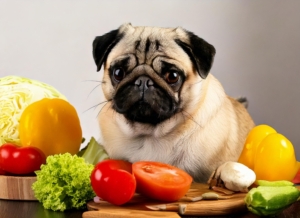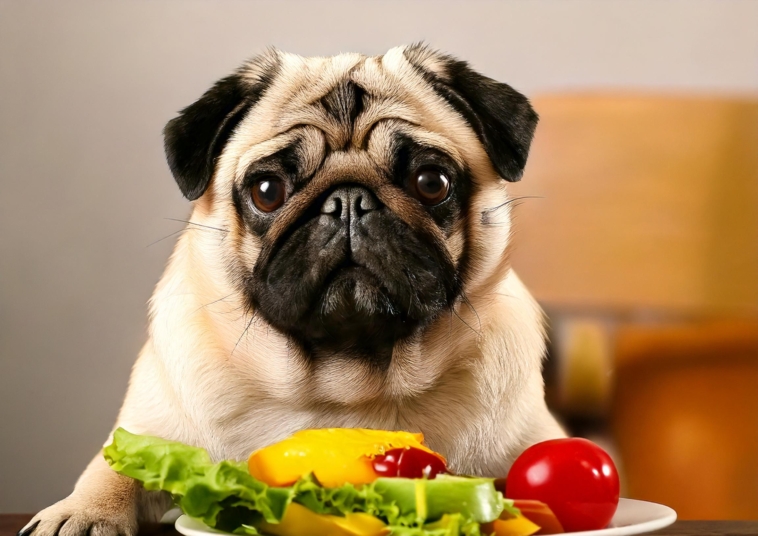Introduction: Diet for Pug
Pugs also need special nutritional requirements due to their tiny size and susceptibility towards obesity and respiratory issues. For optimum health, the right diet with the right nutrients has to be administered to your pug.
Key Nutritional Components:
- Protein: Essential for muscle health and growth. Foods that are good sources include fish, beef, and chicken.
- Fats: Needed for energy and a shiny coat. Opt for sources like fish oil and flaxseed.
- Carbohydrates: Provide energy; choose complex carbohydrates like sweet potatoes and brown rice.
- Vitamins and Minerals: Provide a variety of fruits and vegetables to deliver required micronutrients.
Watch your pug’s weight and portion accordingly.
The Importance of a Balanced Diet
A well-balanced diet is vital to the general health and lifespan of the pug. It gives the body all the nutrients.
Key Constituents of a Well-Balanced Diet:
- Proteins: Needed for building muscles and repairing tissue.
- Carbohydrates: Provide energy for daily activities.
- Fats: Contribute to the health of the skin and coat.
- Vitamins and Minerals: Needed for immune function and general health.
Maintaining a balanced diet keeps the pug’s common pug health issues such as obesity, diabetes, and joint conditions at bay. The owners must make informed decisions about quality ingredients and accurate portions to ensure the pug’s nutritional needs are met in the proper way.
Recommended Foods and Ingredients
It is important to select foods that give a pug its nutritional requirements. Including the following
- ingredients can ensure a balanced diet:
- High-quality protein: Chicken, turkey, beef, lamb, fish, and eggs.
- Healthy fats: Fish oil, flaxseed oil, and chicken fat.
- Complex carbohydrates: Brown rice, sweet potatoes, peas, and oats.
- Vegetables: Carrots, spinach, green beans, and broccoli.
- Fruits: Blueberries, apples, and bananas.
- Supplements: Omega-3 and probiotics.
- Avoid: Corn, soy, and artificial additives.
Proper portion sizes and feeding schedules also play important roles. Professional guidance from a veterinarian is recommended.

Foods to Never Feed Your Pug (Unless You Enjoy Emergency Vet Visits)
Pugs will eat just about anything—including stuff that would make a goat exclaim, “Really?” But just because your little snort-machine is whining with those bugged-out peepers doesn’t mean you have to give them a bite of everything you’re eating.
Below is a list of foods that never need to go into your pug’s bowl (or mouth):
- Chocolate: Delicious for you, hell on wheels for your pug. Theobromine is toxic and could give your pug a not-so-appetizing trip to the vet.
- Grapes & Raisins: Tiny fruit, huge impact—and not the healthy kind. They’ll cause your pug to have kidney failure.
- Onions & Garlic: Sure, they flavor your dish, but they’ll kill your pug’s red blood cells like a food horror flick on a tiny scale.
- Avocado: Contains persin, or in other words, “not pug-friendly.”
- Alcohol: Not a sip. No wine, no beer, no “but it’s just a taste.” Your pug is weird enough sober.
- Caffeine: Coffee, tea, energy drinks—unless you’re looking to have a pug bouncing off the walls with heart palpitations, don’t even bother.
- Bones: That cartoon physics where dogs chew on bones? Yeah, real bones splinter and turn into teeny tiny daggers in your pug’s stomach.
- Xylitol: Found in sugar-free gum and sweets. A drop in blood sugar can be severe and even liver failure in small quantities.
- Feeding Schedule & Portion Control: Because Chubby Pugs Are Cute… Until They’re Not
- Pugs love food like they were born to eat professionally, which is exactly why you need to run a tight kitchen.
How Often Does Your Pug Need to Eat?
- Puppies (0–6 months): 3–4 times a day. They’re growing fast and need the gas.
- Adults: 2 regular meals a day. That’s it—no late-night munchies.
Portion Control Tips from the Anti-Chunky Pug League:
- Measure food using a real cup. Your eyeball guesses aren’t as accurate as you think.
- Ask your vet how many calories your pug needs. Guessing is not an option unless you like surprises.
- No free-feeding. This is not an all-you-can-eat buffet.
- Keep those treats in check and eliminate the table scraps. Your pug does not need a bite of pizza crust, no matter what they’re telling you.
Supplements: Little Add-Ons That Can Make a Big Difference
Pugs may be compact, but their dietary needs are a full-time job. Sometimes, they need a few bonus nutrients to keep things running smoothly.
- Omega-3 & Omega-6 Fatty Acids: For skin that doesn’t flake and a coat that doesn’t look like it lost a bet.
- Glucosamine & Chondroitin: Keep those wobbly joints greased and ready for zoomies.
- Probiotics: Because gas isn’t funny when it’s coming from a 20-pound pug under your covers.
- Multivitamins: Just in case they’re not receiving every vitamin from kibble alone.
Important Note: Pugs are masters at gaining weight just by looking at food. So supplements? Use responsibly. And always talk to your vet first before playing kitchen chemist.
Oh and watch out for food allergies. Some pugs react to chicken, grains, or even dairy like they’ve been personally offended.
Keeping Tabs on That Waistline (If You Can Still See It)
A healthy pug is a happy pug, and that means maintaining those rolls.
- Regular Weigh-ins: Pet scale (or your bathroom scale, some calculation). Weigh often and write it down—pug pounds creep up like ninjas.
- Body Condition Score: There’s a chart for this. If your pug is headed in the direction of meatloaf walker, things need to change.
- Vet Visits: Your vet can help you decide if your pug is in shape or is fluffing out.
- Exercise: Yes, they’d rather nap, but short easy strolls and play will keep those legs limber.
- Adjust Portions: If your pug gets a little thicker over the holidays (like us.), cut food back a bit. No dieting, just sensible adjustments.




